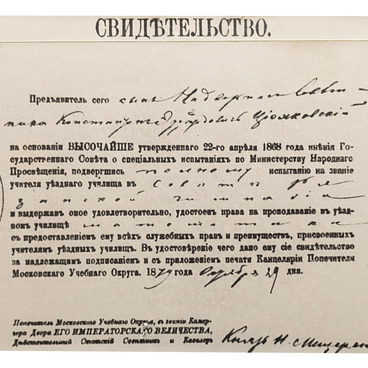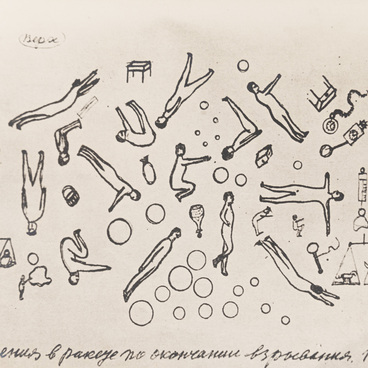In July 1873, Edward Tsiolkovsky decided to send Konstantin Tsiolkovsky to Moscow - to enter the Higher Technical School (now Bauman Moscow State Technical University). His father provided him with an accompanying letter to his acquaintance, and in a letter he asked for help in enrolling his son. However, Konstantin Tsiolkovsky lost the letter and only remembered the address: NemEtskaya Street. He got to this street and rented a room in the laundry lady’s apartment. He never entered the school, but decided to continue his education on his own.
Tsiolkovsky lead a very poor life, literally on bread and water. However, he started to work hard. To save money, Konstantin moved around Moscow only on foot. All available money was spent on books, appliances and chemicals. From 10 a.m. until 3 p.m., Tsiolkovsky studied the sciences in a public library. He followed a strict schedule. In the morning he studied the exact and natural sciences, which required concentration and clarity of mind. After that he would switch to simpler material: fiction and journalism.
He studied “thick” journals with scientific reviews and op-ed articles. He passionately read William Shakespeare, Leo Tolstoy, Ivan TurgEnev, admired Dmitri Pisarev’s articles: ‘Pisarev made me tremble with joy and happiness. At that time I saw my alter ego in him’. In this library the future scientist met with the founder of Russian cosmism Nikolai Fedorov, who worked there as an assistant librarian. Tsiolkovsky later said that Fedorov had replaced university professors for him. However, this influence manifested itself many years later, 10 years after Fedorov’s death, and during his stay in Moscow, Konstantin Tsiolkovsky knew nothing about the views of Nikolai Fyodorov, and they never spoke about space.
During his first year in Moscow, Tsiolkovsky studied physics and the basics of mathematics. Then he moved to differential and integral calculus, advanced algebra, analytic and spherical geometry. Then to astronomy, mechanics, chemistry. In three years Tsiolkovsky has fully mastered the gymnasium program, as well as a significant part of the university program.
It is quite possible that, while studying the sciences in the library, Konstantin Tsiolkovsky studied also the works of Nikolai Brashman, including “Theoretical mechanics”: mechanics was one of the main subjects that interested the young scientist in that period.
Tsiolkovsky lead a very poor life, literally on bread and water. However, he started to work hard. To save money, Konstantin moved around Moscow only on foot. All available money was spent on books, appliances and chemicals. From 10 a.m. until 3 p.m., Tsiolkovsky studied the sciences in a public library. He followed a strict schedule. In the morning he studied the exact and natural sciences, which required concentration and clarity of mind. After that he would switch to simpler material: fiction and journalism.
He studied “thick” journals with scientific reviews and op-ed articles. He passionately read William Shakespeare, Leo Tolstoy, Ivan TurgEnev, admired Dmitri Pisarev’s articles: ‘Pisarev made me tremble with joy and happiness. At that time I saw my alter ego in him’. In this library the future scientist met with the founder of Russian cosmism Nikolai Fedorov, who worked there as an assistant librarian. Tsiolkovsky later said that Fedorov had replaced university professors for him. However, this influence manifested itself many years later, 10 years after Fedorov’s death, and during his stay in Moscow, Konstantin Tsiolkovsky knew nothing about the views of Nikolai Fyodorov, and they never spoke about space.
During his first year in Moscow, Tsiolkovsky studied physics and the basics of mathematics. Then he moved to differential and integral calculus, advanced algebra, analytic and spherical geometry. Then to astronomy, mechanics, chemistry. In three years Tsiolkovsky has fully mastered the gymnasium program, as well as a significant part of the university program.
It is quite possible that, while studying the sciences in the library, Konstantin Tsiolkovsky studied also the works of Nikolai Brashman, including “Theoretical mechanics”: mechanics was one of the main subjects that interested the young scientist in that period.


